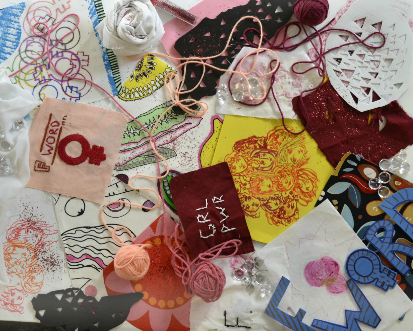McGill is known for its diverse landscape of political and social activism. On Thursday, Oct. 6, the feminist publication collective F WORD, a prominent player in the cultivation of such discourse, held a launch party to celebrate the release of the fourth volume of their zine. The party hosted over 200 people at TR-H Bar—a punk rock venue on Saint-Laurent, known for its graffiti decor and indoor half-pipe.
“It’s got a really good atmosphere, good vibe. Everyone seems to be in […] good spirits, and I’m really excited to be here,” Mimi Ho-Tai, U1 East Asian Studies, said.
The night also had live music and specialty drinks named with feminist puns such as “Intersectionaiquiri,” “Consensual Sex on the Beach,” “Tequila Patriarchy Smasher,” and “Cosmopolitan is a Sh*t Magazine.” In addition to the lively social atmosphere and zines, attendees were able to browse pieces of art, and select clips from feminist films that played during the party.
The zine features feminist art presented through a wide variety of media. This includes art by McGill students, as well as artists from across North America. The F WORD’s free bi-annual zine publication was started in 2014, and operates under a collective-based, non-hierarchical structure. This type of structure fosters an environment where the collective can try to uphold their mandate of anti-oppressive feminism.
Maintaining an intersectional approach entails many complex considerations of overlapping social identities, and the systems of oppression that accompany each one. F Word therefore makes continuous efforts to constantly alter their approach and their content to stay true to their mandate.
“[We] critically assess ourselves and try to change structural problems, if there are any,” Vita Azaro, U3 Arts, and co-coordinator of F WORD said.
Jamie Kim, U2 Honours Physiology student and F WORD’s other co-coordinator, has been involved in F WORD for two years. Last year, she and Azaro oversaw a major revamp of the zine’s design. During this period, the collective was able to decide on an aesthetic direction, and F WORD developed a distinct style. Thinking back on the past couple of years and the zine’s recent revitalization, Kim reflected on the changes the collective and the publication had gone through.
“The quality of our zine has improved a lot,” Kim explained. “[As well as] the number of submissions we get [….] There is definitely a lot more interest within our collective.”
However, the expansion of the zine has also presented significant challenges in upholding their values.
“[We recognize] that [the collective] definitely always has room to learn […] to make changes, and being able to do that in a productive and a constructive way,” Azaro said.
Kim also remarked on how the growth of the collective members itself has posed new hurdles to overcome. As the diversity of its members and content has increased, so has the complexity of the conversations surrounding intersectionality. This has fostered meaningful conversations about many facets of social identities.
“Maintain[ing] our mandate has been a bit more work than in the past because there’s a lot more going on with all the members and interactions,” Kim noted.
As F WORD continues to grow, Azaro hopes to see information about feminisms made available to as many people as possible in order to spread their message further.
“[I hope to see an] online library of resources [to] make information on different aspects of feminisms and other issues such as racism, [and] ableism more easily accessible to people who don’t know how to engage with that information,” she said.
F WORD hopes to continue providing resources and platforms for discussion on the many issues that intersect with feminisms in order to broaden the scope of the conversation. As a feminist publication, it is constantly evolving and learning to accommodate the growth and evolution of feminist ideas. At times, accepting criticism is difficult, but F WORD welcomes the challenge of turning critique into sincere conversation about feminisms and using this discussion to restructure accordingly.








